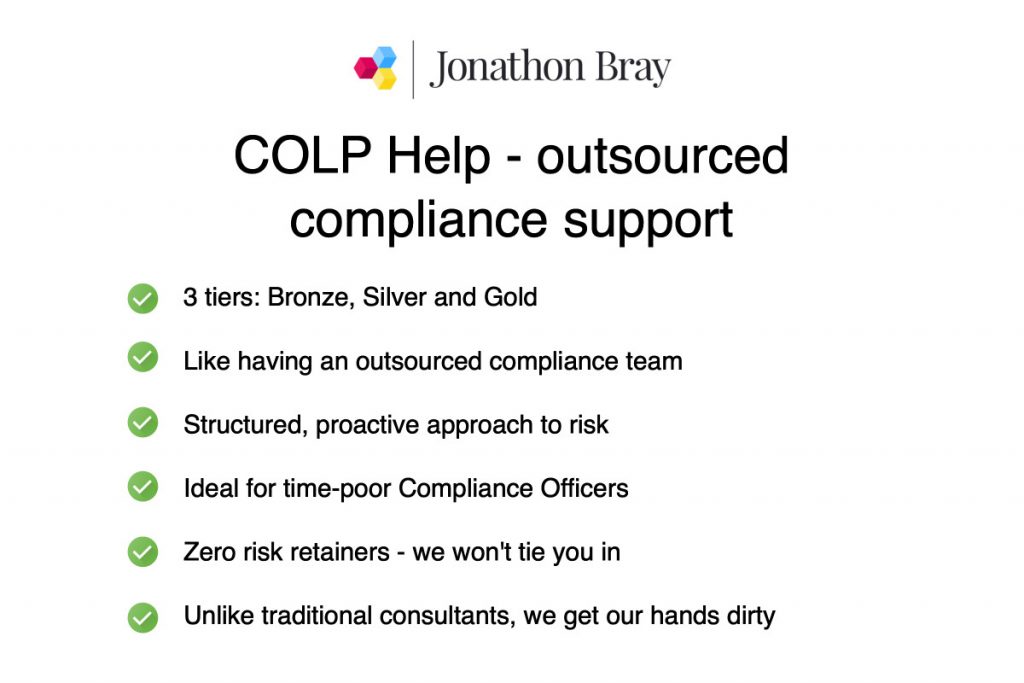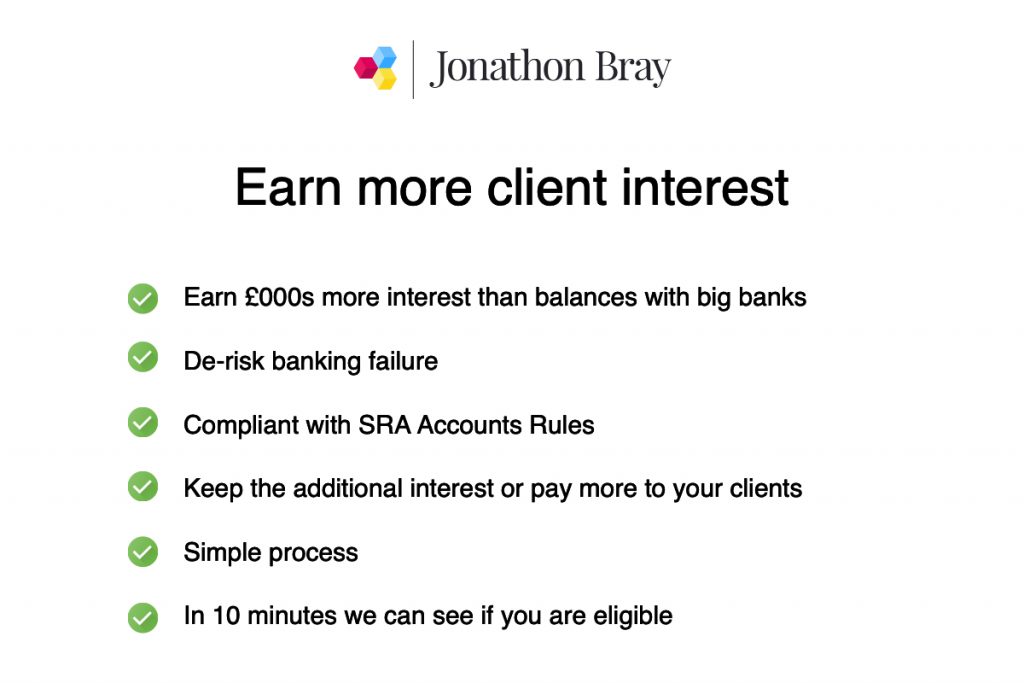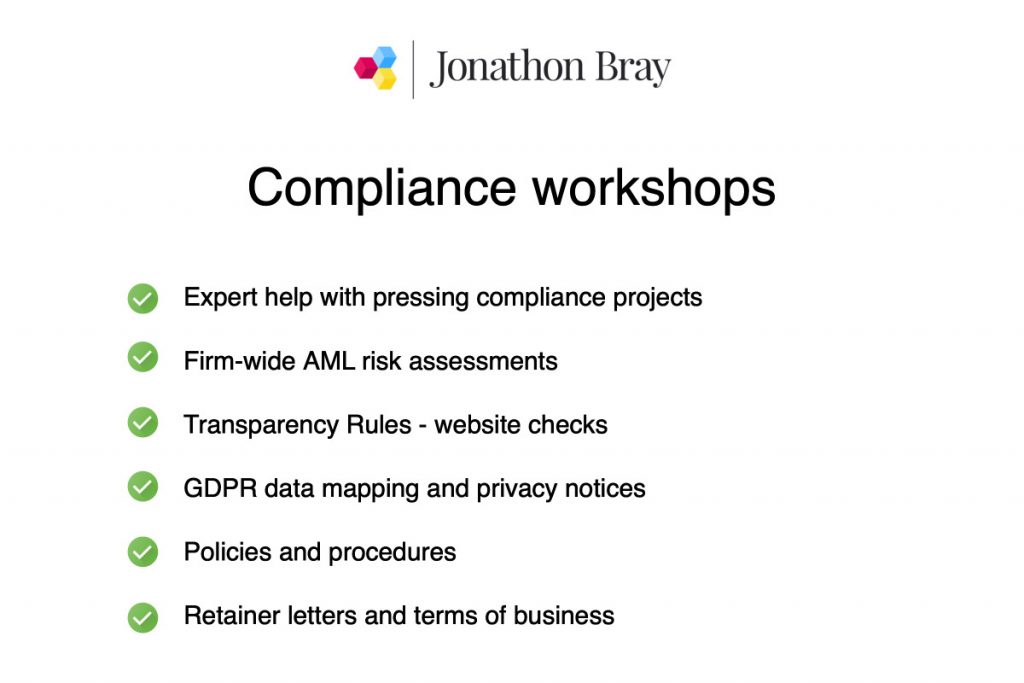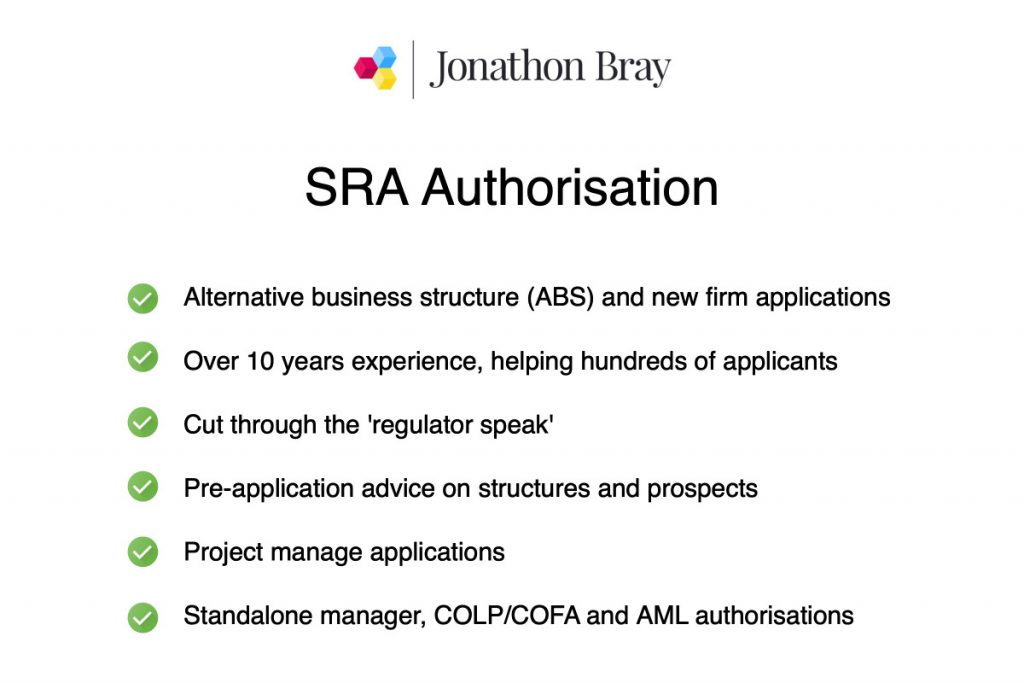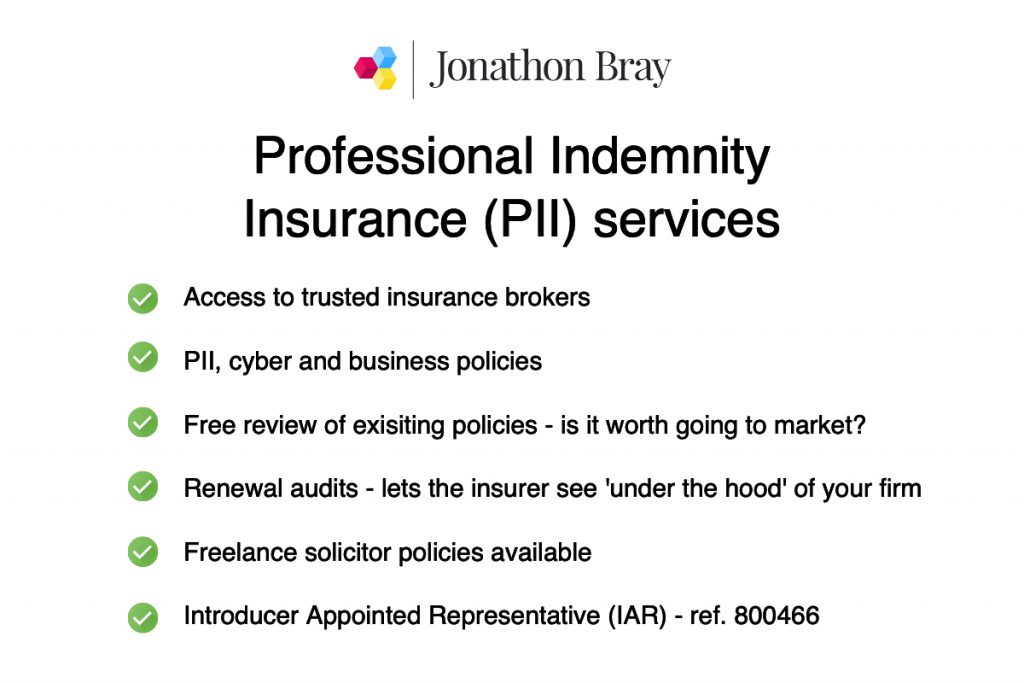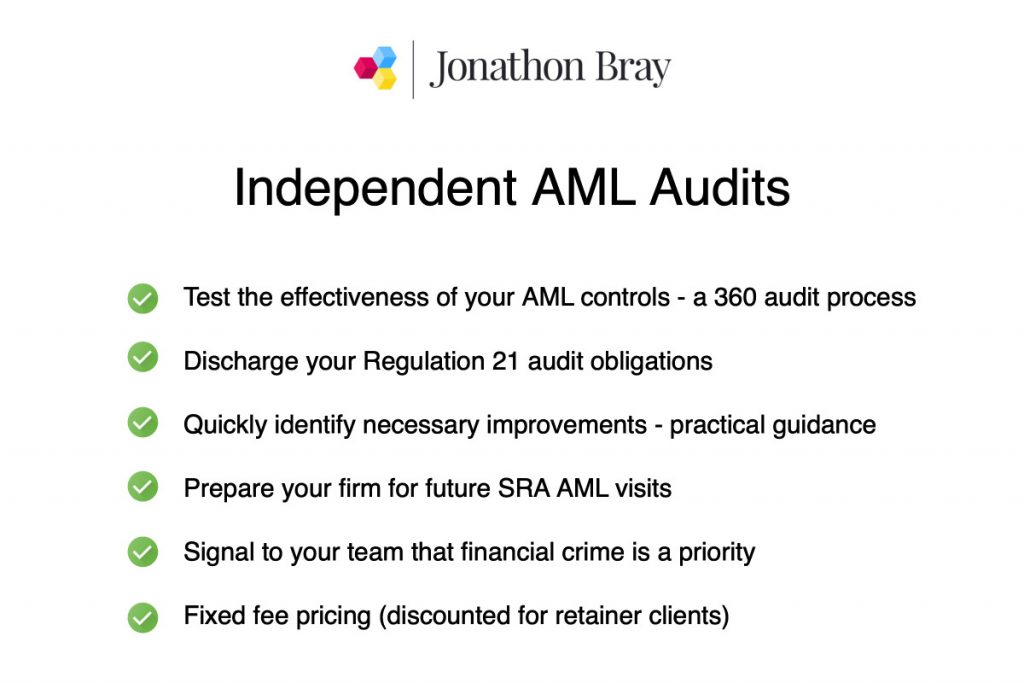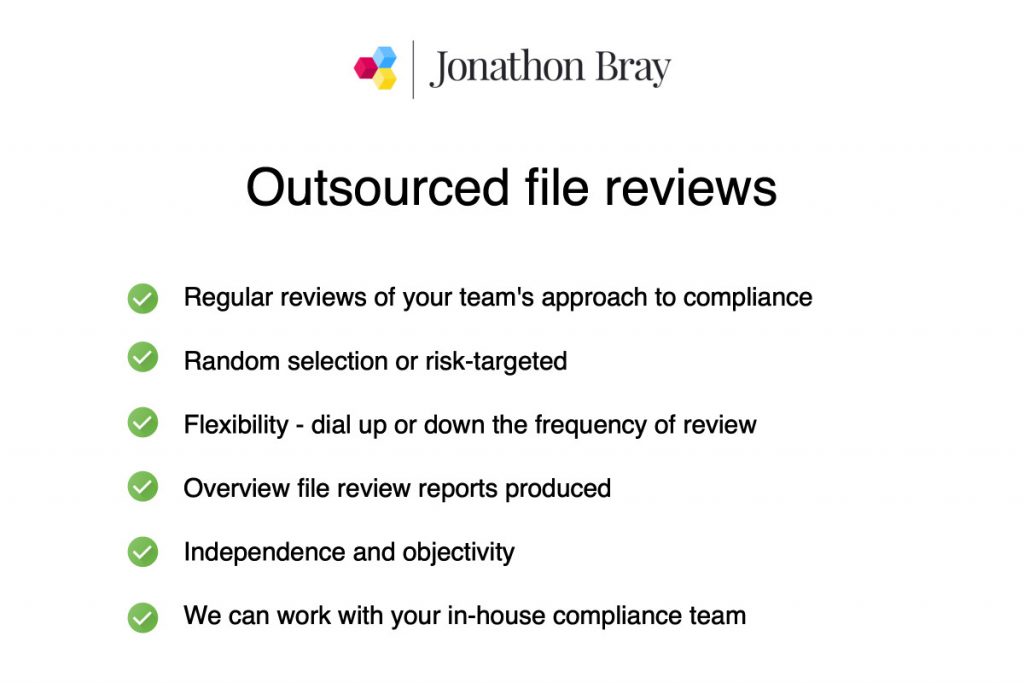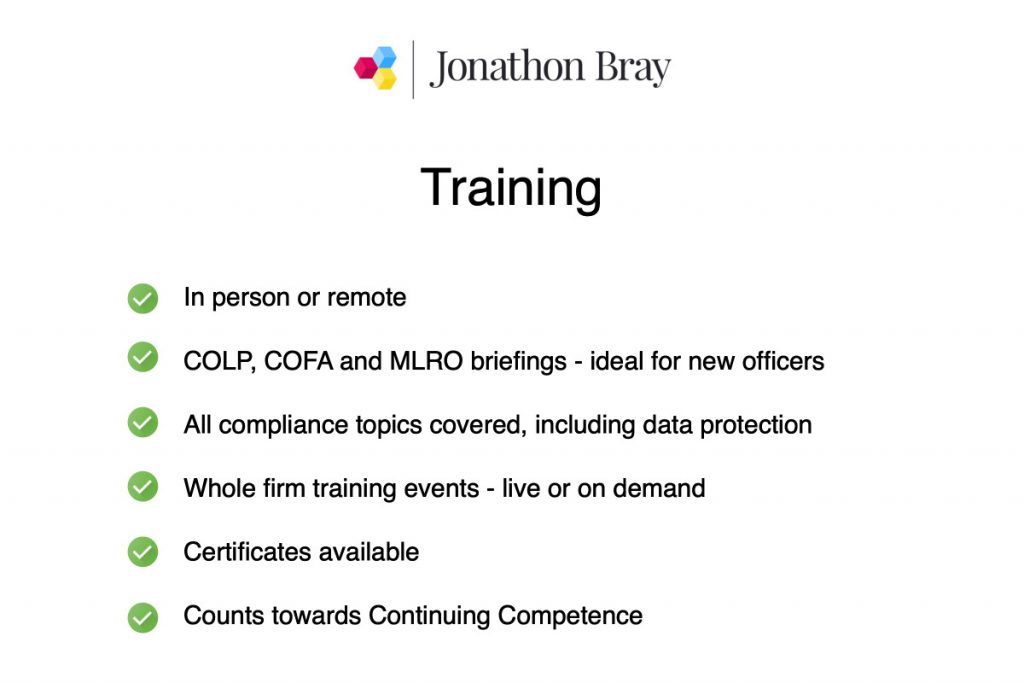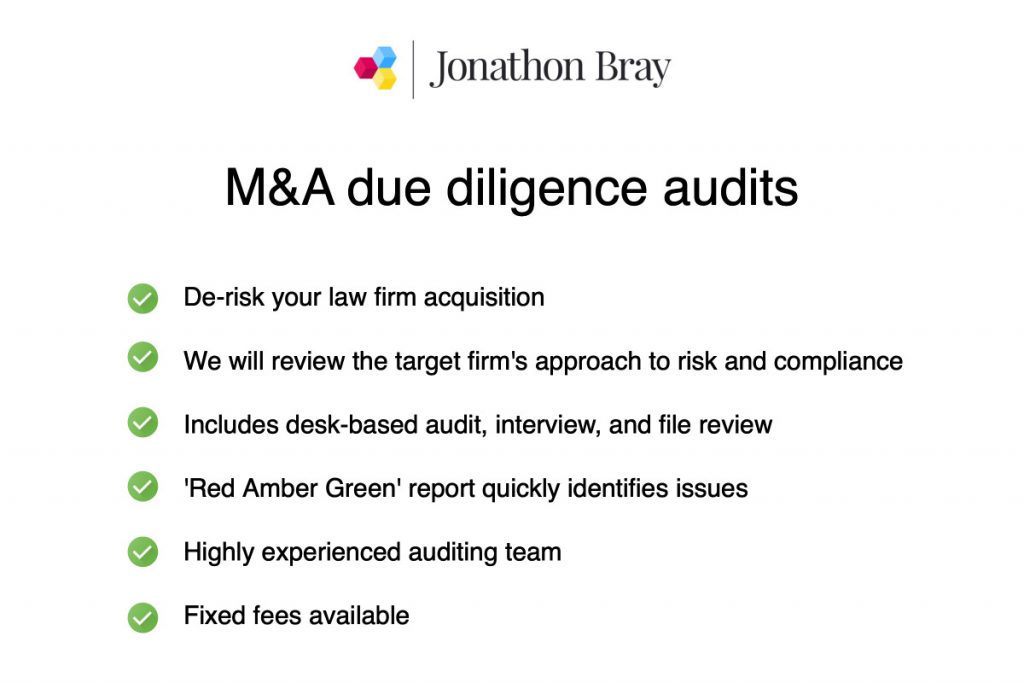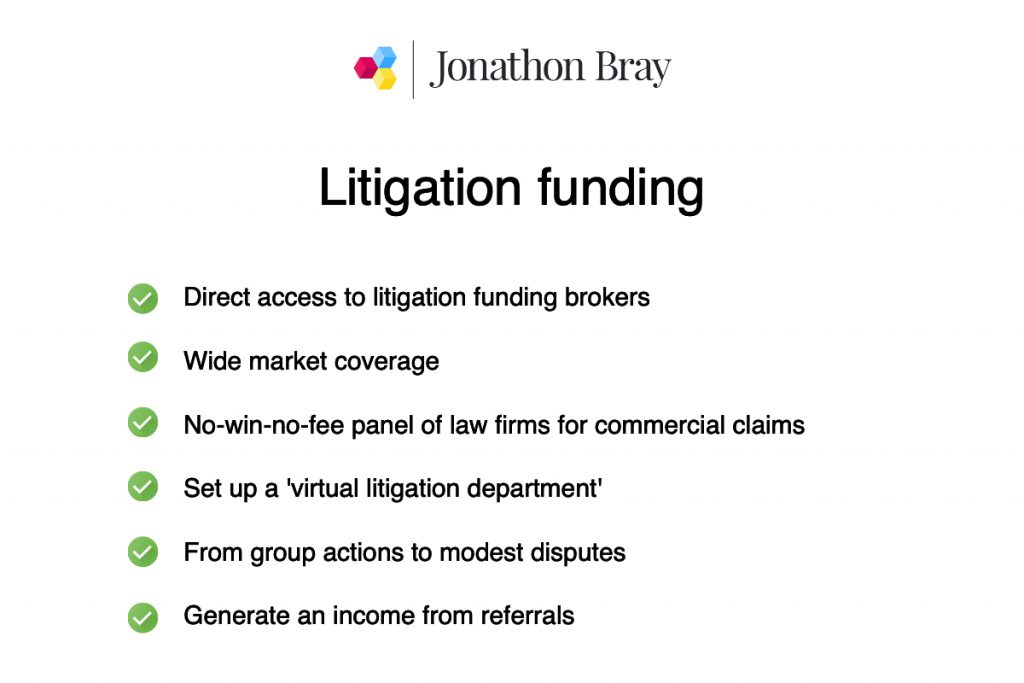Insights From The “Inside Risk & Compliance” Podcast With Jonathon Bray And AJ Fox Compliance
In a recent episode of the “Inside Risk & Compliance” podcast, hosted by Adam Spencer of AJ Fox Compliance, I had the pleasure of delving into the intricacies of law firm risk and compliance, discussing everything from outcome-focused regulation to (my passion) Alternative Business Structures (ABSs). The 30-minute conversation covered a lot of ground, including:
- Transitioning to outcomes-focused regulation
- The role and challenges of compliance officers
- The emergence and impact of ABSs
- Continuous learning and adaptation in compliance
- Looking ahead: challenges and opportunities
Use our free AML policy checklist for law firms
It would be an understatement to say that law firms face increased scrutiny regarding their AML practices. The SRA is intensifying its efforts to combat AML deficiencies, making it crucial for law firms to have robust and compliant AML policies and procedures (PCPs).
The Importance of AML Policies
AML policies are designed to reduce the risk of money laundering, terrorist financing, and proliferation financing. Law firms, gatekeepers to the financial and legal system, must implement effective AML controls to ensure they are not used to facilitate criminal activities. The Money Laundering Regulations 2017 (MLR 2017) require firms to establish compliant PCPs to mitigate these risks.
Clear policies should reflect the practice’s firm-wide risk assessment (FWRA), the theory being that no two AML policies will look identical.
Having a well-crafted AML policy is also a defensive measure. It demonstrates that the firm understands its risks and the underlying law, and has carefully thought through the practical controls that need to be in place.
For employees, the policy should be easy to navigate and unambiguous. It is likely to be the first port of call when a query about financial crime arises.
ICYMI: Shaping the Future: Leveraging the Power of Culture
By Chris Sweetman and Jonathon Bray
“Culture eats strategy for breakfast”. Although some would argue this well-known quote overstates things, most people accept that culture plays an important part in business success.
And with hybrid working here to stay, high profile headlines about working practices, and the SRA’s recent thematic review and guidance, the subject of culture has quickly moved up the agenda of law firms.
In this article, we’ll look at what culture is, why it’s important and some steps that firms can take – both to meet the SRA’s expectations and achieve the wider business benefits of a strong culture.
ICYMI: Strengthening The Team: Effective Strategies For Law Firms To Recruit, Develop, And Retain Compliance Professionals
We asked Adam Spencer of AJ Fox Compliance to write about the recruitment and retention of law firm compliance professionals. And did he ever deliver!
This post is packed with advice for firms looking to recruit compliance staff. It emphasises understanding what candidates seek, selling the firm effectively to potential hires, and the importance of development opportunities to maintain people. It also highlights the benefits of professional qualifications for career progression and underscores the significance of management education. The post stresses the necessity for law firms to genuinely invest in and value their risk and compliance functions to foster a supportive work environment and retain top talent.
ICYMI: SRA and client account interest – Interview with Paul McCluskey
We interviewed Paul McCluskey of specialist banking and finance consultancy Gemstone Legal, about the SRA’s recent reminder to law firms about paying interest to clients.
News and Guidance

- Oversight regulator wants a ‘step-change improvement’ in complaints handling, with SRA involvement where necessary – New Legal Services Board (LSB) guidance specifies how legal regulators should ensure effective, fair, and accessible first-tier complaints procedures. The requirements aim to enhance consumer confidence, ensure prompt and fair complaint resolutions, and facilitate learning and improvement. Key aspects include:
1. Accessibility: Complaints procedures must be free, prominent, and accessible to all.
2. Communication: Clear information on complaint handling and progress updates must be provided.
3. Fair Resolution: Complaints must be resolved efficiently and fairly without disadvantaging complainants.
4. Enforcement: Proportionate actions for non-compliance by authorised persons.
Also see our post Effective Complaints Handling For Solicitors (Top Tips).
- Legal Futures: Peers support widening SRA’s fining and investigative powers – Legal Futures reports that peers in the House of Lords support expanding the Solicitors Regulation Authority’s (SRA) powers to better address misconduct by law firms involved in abusive litigation known as SLAPPs (strategic litigation against public participation). They recommend increasing the SRA’s fining authority and allowing it to investigate third parties hired by law firms, such as PR agencies. The peers argue that current fines are too low to deter wrongdoing and that stronger measures are needed to prevent law firms from outsourcing unethical practices. They also highlight concerns about the misuse of laundered money in SLAPP cases.
- Gazette: Two SLAPP cases bound for SDT – Meanwhile, the Gazette reports that two SLAPP cases are being referred to the Solicitors Disciplinary Tribunal (SDT) by the SRA. Paul Philip, SRA’s chief executive, noted that out of 71 SLAPP reports over the past two years, 48 remain active, with two referrals to the SDT made recently. These cases, seen as test cases, are complex and fact-specific.
- ICO: Organisations must do more to combat the growing threat of cyber attacks – In 2023, over 3,000 breaches were reported, and the ICO’s new report, “Learning from the mistakes of others,” highlights common security failures and provides practical advice. The report highlights the importance of foundational security controls, transparency, and incident response planning. It includes case studies to illustrate frequent security pitfalls and offers practical advice to mitigate these risks, emphasising a layered approach to security and the significance of good cyber hygiene.
- Law Society: Russian sanctions could be improved for the legal sector – The Law Society suggests that Russian sanctions could be improved for the legal sector by providing clearer guidance on licensing timing, reassessing the external counsel disclosure obligation, and broadening the licensing grounds. They argue that the current disclosure obligation discourages UK companies from conducting sanctions compliance risk assessments, leading to less information being provided to the Office of Financial Sanctions Implementation (OFSI).
- Law Society Q&A: Should I report a minor AML breach to the SRA? – The Law Society advises that minor anti-money laundering (AML) breaches, such as a one-off failure to conduct customer due diligence with limited scope and impact, do not need to be reported to the SRA. However, these breaches should be documented for compliance purposes. If there is a pattern of similar breaches or serious breaches, they should be reported. The SRA defines serious breaches as intentional or reckless violations, systemic regulatory failures, or facilitation of money-laundering activities.
- Law Society: Two-fifths of organised crime networks launder money through property – The Law Society reports that 41% of organised crime networks launder money through property, and 86% use legal business structures to facilitate their activities. This information, based on Europol research, highlights the agility, borderless operations, control, and destructiveness of these networks. In its latest sectoral risk assessment, the SRA has identified key AML risks such as application fraud, conveyancing fraud, money laundering, and the infiltration of law firms by organised crime.
Compliance corner – real life Q&As

“What are the rules around solicitors advertising their services? Are there specific regulations about social media use I should be aware of?”
Navigating the rules around advertising and marketing as a solicitor can seem daunting, especially with the advent of digital marketing and social media. It’s essential to understand the rules and specific nuances related to online promotions to maintain compliance with professional standards.
1. General Principles:
The SRA’s principles stipulate that solicitors must promote their services in a way that upholds public trust and confidence in the legal profession. This means your marketing material should always be accurate, truthful, and not misleading. You should avoid any statements that could be interpreted as aggressive.
2. SRA Guidance – Unsolicited approaches (advertising) to members of the public:
The guidance from the SRA reminds us that solicitors are generally prohibited from making unsolicited approaches to the public to advertise legal services, except to current or former clients. This restriction is specified under paragraph 8.9 of the Code of Conduct for Solicitors and paragraph 7.1(c) of the Code of Conduct for Firms. These rules are in place to ensure that such advertising does not feel “intrusive” or “unwelcome” to the public.
However, general advertising to the public is allowed provided it is not directly targeting individuals in a personal and intrusive way. Acceptable methods include advertisements via media that do not single out individuals, such as radio, TV, billboards, newspapers, and general online or social media advertisements. For example, sending leaflets to homes is permissible if it’s done broadly, such as to an entire geographic area, rather than targeted to specific individuals or homes based on more specific information about them.
In all activities, solicitors must ensure their advertising is accurate and not misleading, particularly concerning their charges and services. Furthermore, when engaging in claims management activities, solicitors must consider their client’s attributes, needs, and circumstances to fulfill their duties responsibly under the SRA Codes of Conduct.
Direct “cold” approaches to potential business clients (B2B marketing) is not covered in this guidance, and is not prohibited by the rules. See our post Has the SRA banned B2B marketing?
3. Transparency Requirements:
Solicitors must clearly identify themselves as regulated legal professionals in their advertisements. Clear information about the legal services you offer, the costs, and the terms of engagement must be readily available. This transparency extends to ensuring that any terms and conditions related to offers or promotions are easily accessible and understandable.
4. Social Media Specifics:
When it comes to social media, the same general rules apply, but there are additional considerations given the casual and interactive nature of these platforms:
- Profile and Post Clarity: Make sure your social media profiles clearly state your professional status and the nature of your legal services. Posts should remain professional and reflect the ethical standards expected in the legal profession.
- Engagement: Be cautious when engaging with users. Avoid giving specific legal advice in public comments, or identifying client information. Instead, encourage private consultations.
- Testimonials: If you share client testimonials, ensure they are genuine and not misleading. You must have consent from your clients to share their details.
- Monitoring: Regularly monitor your social media accounts to manage and respond to comments appropriately.
5. Compliance with Other Laws:
Additionally, solicitors must ensure their advertising practices comply with other relevant laws and regulations, such as the UK Advertising Standards Authority (ASA) codes, which cover issues such as misleading advertising and social responsibility.
If you have a question you would like us to answer in this section, feel free to send it to info@jonathonbray.com
Free CPD

Next session: Hacks, attacks and cyber risks
In an era where cyber threats are increasingly sophisticated, it is crucial for law firms to stay ahead of the curve. We are pleased to invite you to our exclusive webinar, “Attacks, Hacks, and Cyber-Risks,” designed specifically for legal professionals.
Date: 29 May 2024
Time: 12:00pm
Platform: Zoom
Join us as we delve into the latest trends in cyber-attacks and hacks, and explore the unique risks they pose to law firms. Our expert panel will provide insights on:
- Current cyber threats targeting the legal sector
- Essential compliance requirements for law firms
- Best practices for mitigating cyber-risks
- Perspectives from leading insurance professionals on managing and insuring against cyber threats
This webinar is an invaluable opportunity to enhance your firm’s cyber resilience and ensure compliance with the latest regulations.
Who Should Attend:
- Law firm partners and managing partners
- IT and cybersecurity professionals in legal services
- Legal compliance officers
- Insurance advisors for law firms
Registration:
To secure your spot, please register here.
Podcast with Jonathon Bray and AJ Fox Compliance: Inside risk and compliance
Recording: compliance clinic April 2024
Last month Rachael, Ed and Jon spent an hour on Zoom discussing various compliance issues that have caught their eye recently. In an informal session we covered topics including:
- Cyber-crime – latest impacts on the profession
- LOCS23 – the new data protection accreditation for the legal sector
- Insurance distribution – it’s boring but important
- AML fines – the ever-increasing risk exposure for law firms
- The consultation on improving the Money Laundering Regulations
Watch the recording (passcode 7wrZ%+ZQ)
Training resources: On-demand webinar archive
Contact us for access to our extensive back catalogue of recorded webinars. Topics include:
- Financial crime: LSAG, firm-wide risk assessments, client due diligence etc.
- Sanctions
- Use of client account as a banking facility
- Data protection
- Financial stability
- Conflicts and confidentiality
- SRA Transparency Rules
- Accounts Rules
- Employee Ownership Trusts (EOTs)
- Register of overseas entities
- Sexual misconduct and solicitors’ private lives
- Terrorist financing
- And more….
We also produce bespoke training webinars, live workshops for your team and COLP and COFA training.
SRA and SDT disciplinary decisions

- Constantinos Avraamides – non-lawyer disqualified from the profession following ABH conviction.
- Panayiota Constantinides – Junior Compliance Officer removed from the profession for submitting false overtime claims to her law firm employer.
- Neil Adams – Head of dispute resolution (CILEX fellow) removed from solicitor’s profession for failing to “account to the firm for benefits received in lieu of fees for legal services provided to a client…This conduct favoured his own interests over those of his employer and its client, who were entitled to have those interests preferred over his own.“
- Gregg Holden – litigation locum (not a solicitor) disqualified from the profession for submitting false timesheets through a false domain and email address.
- Hannides & Co Limited – firm fined £8,964 for deficient money laundering controls, including firm-wide risk assessment, AML policy, employee training and client/matter risk assessments.
- Emma Beck – legal assistant removed from the profession for taking cash payments of over £4,000 from clients and failing to account to the firm.
- Amy Lianne Jones – conveyancing assistant disqualified for dishonestly signing a form in the name of a supervisor, under pressure from a client eager to complete a property purchase.
- William Bailey Solicitors – firm fined £5,224 for not having compliant AML documentation, namely an AML policy and client/matter risk assessments.
- James Brunton – solicitor fined £1,183 for failing to comply with an undertaking to pay another party’s legal fees within a reasonable time frame, which was compounded by a failure to engage with the SRA’s investigation.
What we do – contact us for further information about our services
